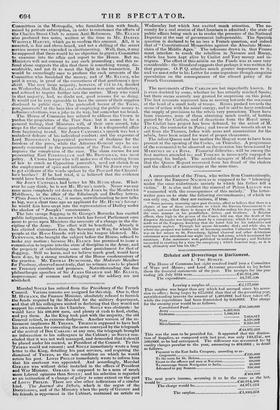Marshal SOULT has retired from the Presidency of the French
Council. Various reasons are assigned for this step. One is, that M. HUMANN, the Finance Minister, absolutely refused to furnish the funds required by the Marshal for the military department, and that all his colleagues united in declaring that they would not support his estimates in the Chamber. SOULT was obstinate : he would have his 400,000 men, and plenty of cash to feed, clothe, and pay them. As the King took part with the majority, the old General retired, in extreme dudgeon. Another version of the re- tirement implicates M. THIERS. THIERS is supposed to have had his own reasons for concealing the news conveyed by the telegraph of the arrival of Don CARLOS: at any rate, the telegraph brought no information to his colleagues in the Cabinet ; so SOULT con- cluded that it was not well managed, and demanded that it should be placed under his control, as President of the Council. To this THIERS would not consent; and SOULT immediately wrote a long letter to the King, detailing his past services, and requiring the dismissal of THIERS, as the sole condition on which he would retain his post. Louis PHILIP immediately wrote to inform him that his successor was appointed. And accordingly, Marshal GERARD was without delay installed in the offices of President and War Minister. GERARD is supposed to be a man of much more Liberal opinions than SOULT; and his selection is regarded as an intimation of a change of policy to some extent on the part of Louis PHILIP. There are also other indications of a similar kind. The Journal des Debats, which is the organ of the Doctrinaires, and of the Ministry when the party of GuizoT and his friends is uppermost in the Cabinet, contained an article on Wednesday last which has excited much attention. The ne- cessity for a real session of the Chambers is admitted ; the state of public affairs being such as to render the presence of the National Deputies at the seat of government indispensable. The Spanish question is declared to be no less a French question, and indeed that of " Constitutional Monarchies against the Absolute Monar- chies of the Middle Ages." The inference drawn is, that France must interfere to crush the rebellion in Navarre and Biscay, which has been kept alive by Carlist and Tory money and in- trigues. The effect of this article on the Funds was at once very considerable : the Standard suggests that perhaps it was written for that purpose. 0. P. Q. attaches much greater importance to it; and we must refer to his Letter for some ingenious though sanguine speculation on the consequences of the altered policy of the French Government.




















 Previous page
Previous page